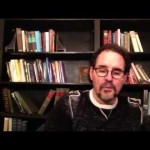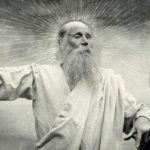We run our website the way we wished the whole internet worked: we provide high quality original content with no ads. We are funded solely by your direct support. Please consider supporting this project.
How do you respond to Psalm 139:16?
“In your book were written all the days that were formed for me, when none of them as yet existed.”
Psalm 139 is a beautiful poetic expression of God’s personal moment-by-moment involvement in our lives. So intimate is his involvement that he knows our thoughts before we utter them (vs. 2–4). His loving presence surrounds us at every moment, wherever we go (vs. 5–12). And he was personally involved in the formation of our bodies while we were in the womb (vs. 13–16). God’s knowledge of us and care for us is simply unfathomable (vs. 17–18).
Many have argued that verse 16 of this chapter implies that the future is exhaustively settled. If the exact number of days we shall live is settled in God’s mind, they argue, the whole of the future must be settled as well. Hence this verse has been frequently cited in support of the classical view of the future. I find this line of reasoning based on this verse to be unconvincing for five reasons.
First, even if this verse said that the exact length of our life is settled before we’re born, it wouldn’t follow that everything about the future is settled before we’re born. God can predetermine and/or foreknow a great many things about the future without predetermining and/or foreknowing everything about the future.
Second, the use of hyperbolic expressions, which was a common devise of Semitic poetry, should caution us against relying on it to settle any doctrinal disputes. The point of this passage is to poetically express God’s care for the psalmist from his conception, not resolve metaphysical disputes regarding the reality of the future.
Third, the Hebrew in this passage is quite ambiguous in that a) the word translated in the NRSV as “formed” (yotsar) can be interpreted in a strong sense of “determined” or in a weaker sense of “planned”; and b) the subject matter of what was “formed” and written in the “book” before they existed is not supplied in the original Hebrew. It is thus not clear whether what was planned was the days of the psalmist’s life or rather parts of the psalmist’s body. The NKJV is an example of a translation that decided on the latter meaning. It reads:
“Thine eyes did see my substance, yet being unformed; and in thy book all my members were written, which in continuance were fashioned, when as yet there was none of them.”
This rendition of the verse, though admittedly awkward, has the advantage of consistency with the immediate context of the verse. As mentioned above, the theme of verses 13 through 15 is the formation of the psalmist’s body in the womb. Indeed, the first stanza of verse 16, “Your eyes beheld my unformed substance” also concerns the intimate awareness the Lord has of the psalmist even before he’s formed. An interpretation of this verse that continues the author’s poetic expression of the remarkable care that the Lord took in forming his body seems most appropriate.
If this interpretation is accepted, then we cannot conclude anything about the settledness of the future from it. Even if the poetic genre of the verse isn’t enough to discourage someone from trying to resolve a metaphysical issue on this basis, the ambiguity of the verse itself should certainly be enough.
Fourth, even if we choose to take the subject matter of what is “formed” and “written” in this verse to be the days of the psalmist’s life, this does not require that the length of his life is unalterable. Scripture elsewhere suggests that what is written in the Lord’s book of life can be changed (Exod. 32:33; Rev. 3:5). Hezekiah’s success in changing God’s mind regarding the length of his life supports this perspective (Isa. 38:1–5) as does the Lord’s self-professed willingness to alter decrees he’s made in the light of new circumstances (Jer. 18:6–10). The notion that what God ordains is necessarily unalterable is foreign to the Hebrew mind.
In the context of the whole council of Scripture, it therefore seems best to understand the term yotsar as well as the writing in God’s book as referring to God’s intentions at the time of the psalmist’s fetal development, not to an unalterable decree of God.
Finally, even if metaphysics continue to be read into this passage, and even if the subject matter of what was “formed” and written in the Lord’s book was the days of the psalmist’s life, and even if what was “formed” and written was unalterable, the verse still does not mean that all the days of the psalmist were ordained and written in God’s book. The verse only says (in the NRSV), “In your book were written all the days that were formed for me…” (emphasis added). What was written was not all the psalmist’s days, but only those days that were formed (or “ordained”) before they yet existed.
This interpretation can be understood to imply that certain events were predestined about this person’s life before he was born, though within the parameters of this predestined outline, his life is free. As with king Josiah which we examined above (1 Kings 13:2-3), it is possible that certain events are preordained for many of us prior to our birth. This assumption, in case it is true, does not conflict with the open view perspective which simply says that not everything about us is determined and/or foreknown.
Category: Q&A
Tags: Open Theism, Q&A
Topics: Open Theism, Responding to Objections
Verse: Psalm 139
Related Reading

Podcast: Is Open Theism an Accommodation?
Or for that matter is accommodation an accommodation? Greg talks about things that impact God. http://traffic.libsyn.com/askgregboyd/Episode_0407.mp3

Free Will: Is it a coherent concept?
Greg is going to be spending the next several blogs talking about the idea of free will. In this first reflection, he discusses whether it is coherent to speak of a decision that is not determined or exhaustively caused.

Podcast: Do Open Theists Believe that God EVER Intercedes Directly in the World?
Greg considers God’s intervention in light of human prayer, and discusses the covenant of non-coercion. http://traffic.libsyn.com/askgregboyd/Episode_0122.mp3 [3] Swain, 40. Photo via Ted Van Peltflickr.com

Last Minute Preparations
We’re all busy here at ReKnew making last minute preparations for the Open2013 conference here in St. Paul, MN. It’s our first ever event of this kind and there’s a nervous energy and anticipation. I wonder if you’ll hold this up in prayer if you weren’t able to join us? We have a last minute…

Response to the September 11th attacks
Was God Punishing Us? Since the attacks on the World Trade Center and the Pentagon on September 11th, many people have asked the question, “Why did God allow this to happen?” In response, some Christian leaders have suggested that God was punishing our country for reaching an all-time low in moral behavior. As one well-known…

The Open View and Predestination
Paul wrote in Ephesians, “For he [God] chose us in him before the creation of the world to be holy and blameless in his sight. In love he predestined us for adoption to sonship through Jesus Christ …” (Eph 1:3-4). Some argue that the particular way Scripture portrays God’s providential plan is incompatible with the…
